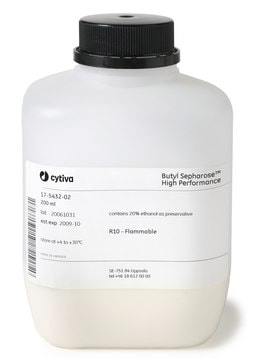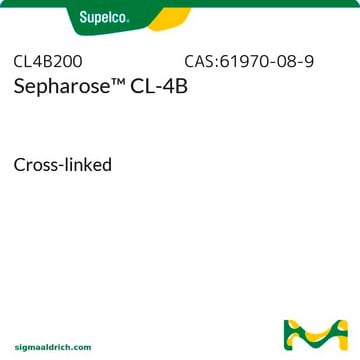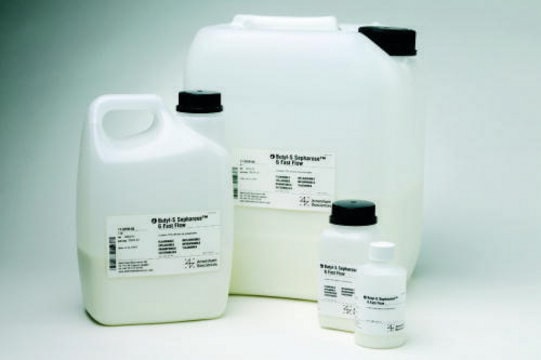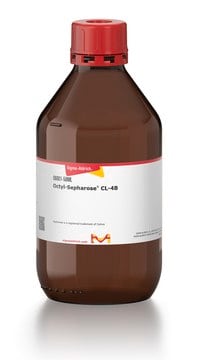Recommended Products
form
suspension
Quality Level
extent of labeling
~50 μmol per mL gel
matrix
agarose, 4% crosslinked
matrix activation
epoxy
matrix attachment
ether
particle size
45-165 μm
storage temp.
2-8°C
Application
Butyl Sepharose™ is used in affinity chromatography, hydrophobic interaction media, separation media and resins. Butyl-Sepharose™ has been used to study inflammatory diseases.
Physical form
Suspension in 20% aqueous ethanol
aqueous ethanol suspension
Legal Information
Sepharose is a trademark of Cytiva
Signal Word
Warning
Hazard Statements
Precautionary Statements
Hazard Classifications
Flam. Liq. 3
Storage Class Code
3 - Flammable liquids
WGK
WGK 1
Flash Point(F)
102.2 °F
Flash Point(C)
39 °C
Choose from one of the most recent versions:
Already Own This Product?
Find documentation for the products that you have recently purchased in the Document Library.
Customers Also Viewed
Bridget L Decker et al.
The Journal of biological chemistry, 281(20), 14523-14528 (2006-03-28)
Membrane fusion and protein trafficking to the vacuole are complex processes involving many proteins and lipids. Cytosol from Saccharomyces cerevisiae contains a high Mr activity, which stimulates the in vitro homotypic fusion of isolated yeast vacuoles. Here we purify this
Wei Yang et al.
Protein expression and purification, 76(1), 59-64 (2010-09-11)
Dipeptidyl peptidase I (DPPI) plays a crucial role in maturation of many regulatory peptides and has been suggested as a pharmaceutical target in several inflammatory diseases. It is also a useful processing enzyme for the generation of authentic protein products
Investigation of protein retention in hydrophobic interaction chromatographic (HIC) systems using the preferential interaction theory and quantitative structure property relationship models.
Chen, J., et al.
Reactive functional Polymers, 67(12), 1561-1569 (2007)
Chemical and chromatographic characterization of a new bioprocess? medium for hydrophobic interaction chromatogrpahy: Butyl Sepharose? 4 FastFlow.
Berggrund, A., et al.
Process. Biochem., 29(6), 455-463 (1994)
Beckley K Nfor et al.
Journal of chromatography. A, 1218(49), 8958-8973 (2011-08-27)
Salt-induced protein precipitation and hydrophobic interaction chromatography (HIC) are two widely used methods for protein purification. In this study, salt effects in protein precipitation and HIC were investigated for a broad combination of proteins, salts and HIC resins. Interrelation between
Our team of scientists has experience in all areas of research including Life Science, Material Science, Chemical Synthesis, Chromatography, Analytical and many others.
Contact Technical Service
















